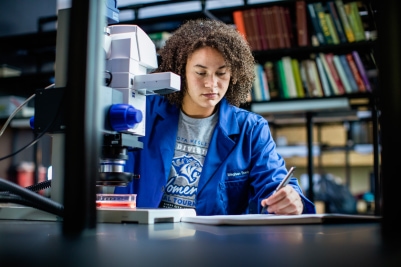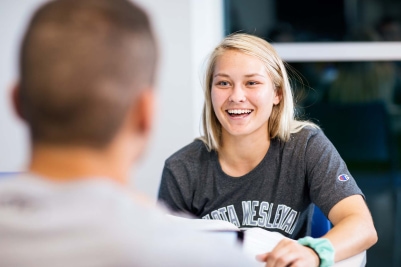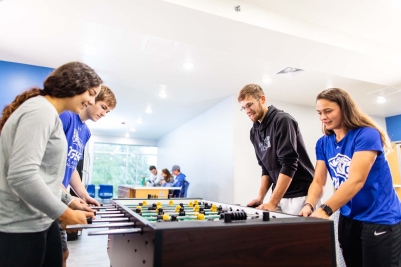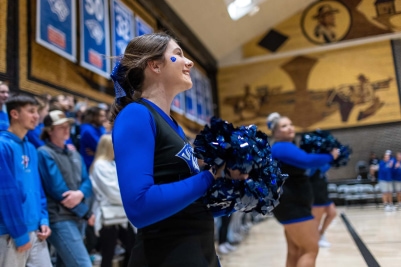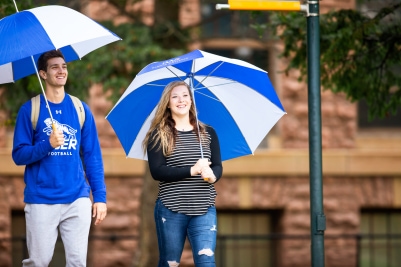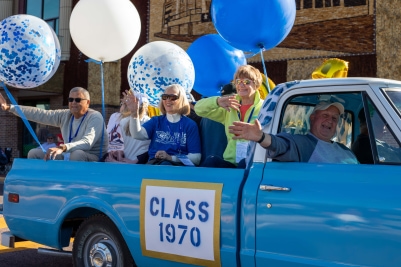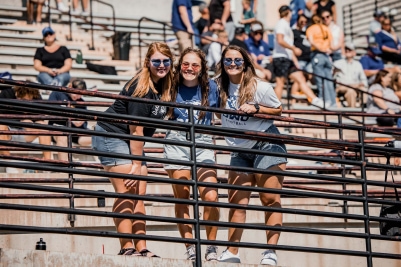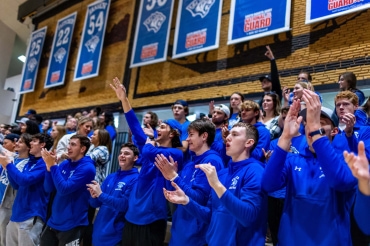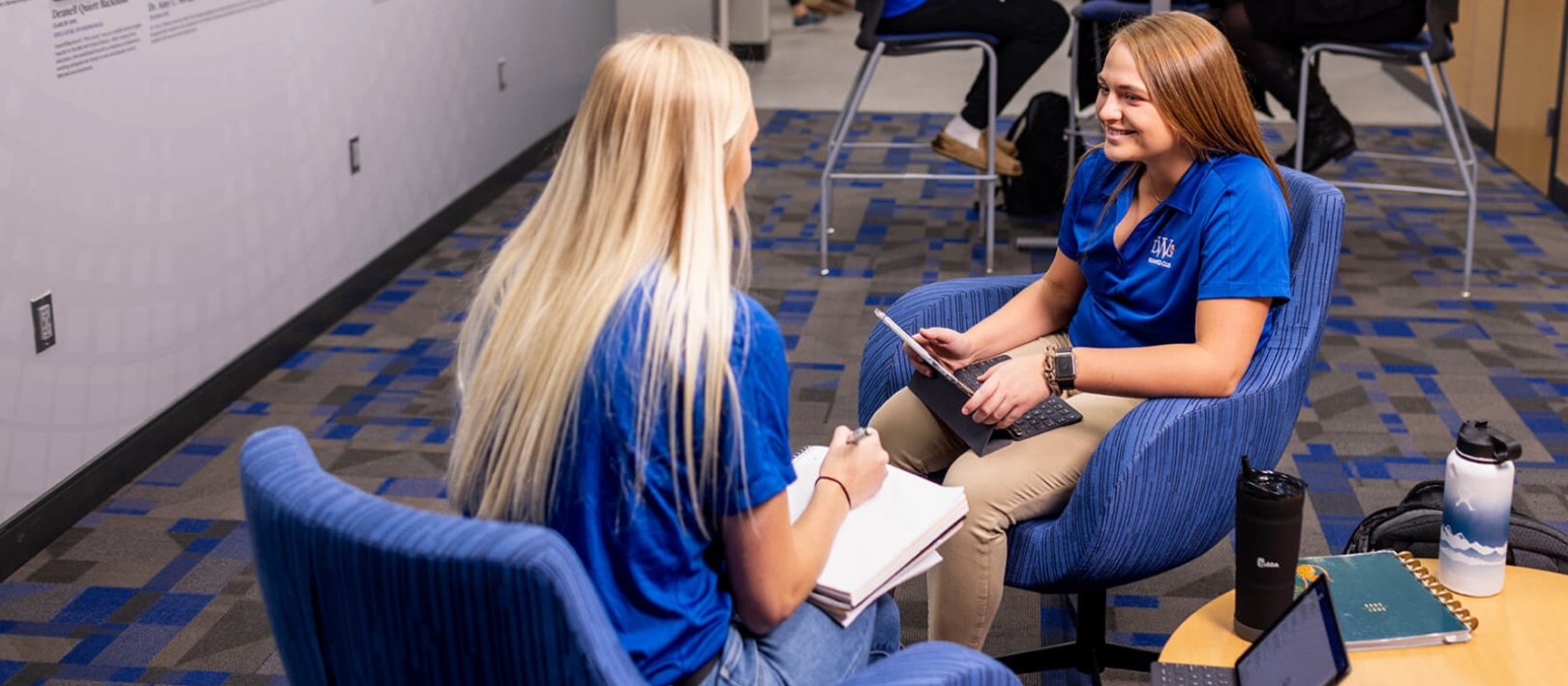Athletic Training
Heal on the Sidelines
Wondering what your career possibilities are in sports medicine?
Jobs are open to you with an athletic training degree in locations such as:
Colleges and Universities
Health Care Clinics
High Schools
Industrial Corporations
Olympic Sport Centers
Sports Medicine Centers
Professional Sports
What's the Difference at DWU?
- Enroll in one of only three 5-year Master’s in Athletic Training programs in S.D.
- Observe athletic trainers up close as early as your first semester.
- Complete at least 800 hours of field experience by the time you graduate.
- Work or continue your studies: 100% of DWU graduates are employed in the field or accepted into graduate programs.
Accreditation
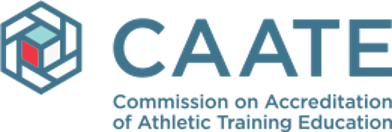
The DWU Department of Athletic Training is accredited through the Commission on Accreditation of Athletic Training Education (CAATE) located at 2001 K Street NW, 3rd Floor North in Washington, DC 20006, phone number 512-733-9700 and toll free 844-GO-CAATE (844-462-2283).
Become Athletic Training Certified
The Master of Athletic Training degree is based on a 3+2 plan. You will come to DWU as a pre-athletic training student and spend three years taking prerequisite courses. At the end of three years, you may apply for the two-year master's program.
If you are a student-athlete, you may compete in intercollegiate sports for four years and still complete the MAT in five years. If you wish to compete for 5 years, it is encouraged you complete a bachelor’s degree (Biology or Exercise Science are recommend) and apply to the master's program following the bachelor’s degree completion.
After you earn your master's degree, take the national certification exam, receive your ATC and have a resumé that stays at the top of the pile.
The American Medical Association recognizes ATCs as allied healthcare professionals. You will prevent, assess, treat and rehabilitate injuries of active individuals.
Athletic Training Courses
Check out the courses on the way to completing Athletic Training degree. And refer to our handy Curriculum Plan to envision what your semesters might look like.
Prerequisite Coursework
Athletic training prerequisite coursework or approved similar coursework includes:
Prevention and Care of Athletic Injuries
Introduction to Athletic Training/Healthcare Professions
Medical Terminology
Human Nutrition
Advanced Emergency Skills for Professionals or EMT (or proof of current CPR for the healthcare professional certification)
Kinesiology/Biomechanics
Physiology of Exercise
Anatomy & Physiology – 8 credits
University (General) Chemistry – 8 credits
Statistical Methods – 1 semester
General Biology-4 Credits
Physics – 4 credits
General Psychology or Developmental Psychology
Abnormal Psychology
English Composition
Speech or Interpersonal Communications
ATN 100 Principles of Athletic Training I
ATN 105 Principles of Athletic Training II
ATN 610 Advanced Principles of Athletic Training
ATN 625 Concepts in Evidence Based Practice
ATN 629 Health and Fitness Assessment
ATN 630 Pathology and Evaluation I
ATN 635 Pathology and Evaluation II
ATN 640 Practicum in Athletic Training I
ATN 642 Practicum in Athletic Training II
ATN 644 Practicum in Athletic Training III
ATN 646 Practicum in Athletic Training IV
ATN 648 Practicum in Athletic Training V
ATN 650 Clinical Immersion in Athletic Training
ATN 665 Healthcare Administration
ATN 672 Public Health and Epidemiology
ATN 680 Biomechanics
ATN 683 Therapeutic Modalities
ATN 685 Therapeutic Exercise
ATN 687 Medical Aspects and Pharmacological Interventions I
ATN 689 Medical Aspects and Pharmacological Interventions II
ATN 690 Research Methods
ATN 692 Thesis
HLT 100 Introduction to Healthcare
Get to Know Your Professors
Strengthen your understanding of sports medicine with us! Get to know our faculty who you'll learn from in the classroom and on the field.
Dan Wagner, EdD
Kristen Longville
Matthew Zens, DPT
Randi Christensen, M.A.
Rebecca Buchholz, MAT, ATC
The Experience
Your education will take you through an intensive prerequisite curriculum prior to applying to the Athletic Training program. As part of that you will document a minimum of 50 hours of clinical observation with a certified athletic trainer.
Program Objectives and Student Learning Outcomes
- You will be able to practice and master the knowledge gained in the classroom and show the ability to apply the entry-level skills in a clinical setting.
- You will participate in a variety of service-learning projects to instill an attitude of service to your community and to the profession.
- You will show that you understand the moral and ethical behavior required by the NATA Code of Ethics.
Athletic Training Department Goals
The goals and objectives of the Dakota Wesleyan University Athletic Training Program are:
- To prepare undergraduate athletic training students for careers in athletic training.
- To fulfill the competencies and proficiencies in Athletic Training as established by the Commission on Accreditation of Athletic Training Education (CAATE).
- To teach, demonstrate, and adhere to the NATA Code of Ethics.
- To provide a quality clinical experience in the athletic training facilities that compliment the educational program.
- To encourage the overall development of leadership skills and service to the community and to the athletic training profession.
Hands-On Training
Our health and sports partners will provide you with plenty of options for watching, working with and experiencing hands-on applications of concepts you have learned in the classroom. Five semesters of Practicum classes will ensure that you are highly qualified for certification and employment as an athletic trainer.
Athletic Training Admission Requirements
Admission to the Master of Athletic Training program is contingent upon satisfactorily completing the following requirements:
- All students must complete the application process given to them by the Athletic Training program chair. Transfer students must first complete an application to the DWU graduate program.
- Minimum of 50 hours of documented clinical observation with a certified athletic trainer
- Minimum of 3.0 cumulative GPA
- Minimum of 3.0 GPA in the athletic training prerequisite coursework
- Successful completion of or enrollment in all prerequisite coursework with a minimum grade of C in each course
- No program or prerequisite course can be repeated more than one time
- All required courses must have a letter grade (credit/no credit courses will not be accepted)
- Two letters of recommendation (excluding members of the ATRC)
- Demonstration of appropriate clinical conduct and performance, to include:
- productive and reliable work habits
- ability to work in harmony with athletes, coaches, peers and certified faculty members
- self-motivation and the commitment to execute tasks and responsibilities as assigned and directed
- professional grooming, dress and appearance
- punctuality
- patience
- willingness to assist others in the completion of tasks and responsibilities
- efficient and productive use of time
A maximum of 20 new students are accepted into the program annually. Applications are due by May 1.
Successful completion of all of the requirements above does not guarantee admission into the Master of Athletic Training program. The athletic training program is a limited enrollment program based on the availability of preceptors.
To apply to the Dakota Wesleyan University Master of Athletic Training Program please contact Dan Wagner EdD, ATC or DWU Admissions.
- Following the submission of application materials, you will be invited to participate in an interview process. On-campus interviews are preferred but virtual interviews will be considered when appropriate.
- Determination of admission to the athletic training program is the responsibility of the athletic training department. You must meet all departmental and university admission requirements.
- Following the interview, you will receive written notification of admission status. You will then have two calendar weeks to accept or decline a position in the Master of Athletic Training program. Students who are accepted into the program will be officially admitted as of the first day of the next academic semester. Students who are not accepted into the program will be allowed to re-apply if they meet all prerequisites.
- Provisional acceptance may be allowed and will follow the university procedure found in the Graduate Studies Handbook.
- You may appeal admissions decisions via the university appeals process found in the Graduate Studies Handbook.
Post-Admission Requirements
All costs associated with the following requirements are your responsibility.
- Immunizations
- Immunizations are your responsibility as an athletic training student accepted into Dakota Wesleyan University and into the athletic training program. Immunizations are required prior to participating in clinical education. This includes the (2) MMR, Hepatitis B and Tdap vaccinations, a Varicella vaccination or a titer proving immunity and yearly Tuberculosis testing and an annual influenza vaccination.
- You are required to meet all vaccinations requirements to perform clinical rotations. If you have a specific medical condition that would prevent vaccination, you should meet with the PD or the CEC for consultation. More information can be obtained from campus health.
- Physical Examination
- You are required to submit a copy of a physical examination that has been completed within one calendar year of acceptance. The physical examination must be performed by an appropriate provider. Dakota Wesleyan University accepts physicals performed by MDs, DOs, CNPs, PACs. Download the physical exam form.
- Liability Insurance
- Athletic training student liability insurance is also your responsibility as an athletic training student accepted into the athletic training program. Proof of insurance is required prior to participating in clinical education. Specific requirements for the liability insurance and information on policies can be obtained from the clinical education Coordinator. Minimum coverage includes $1 million per occurrence/$3 million aggregate (student coverage).
- Criminal Background Check
- A criminal background check must be completed before final acceptance into the MAT program. Information will be given to by the coordinator of clinical education. The coordinator of clinical education will provide you with information upon acceptance.
- Technical Standards
- You must read and sign the technical standards required for the MAT program annually.
Program Costs
Master of Athletic Training Program Cost
Tuition
Summer Session I – $2,167
Year I – $11,000 ($5,667 per semester)
Summer Session II – $2,167
Year II – $11,000 ($5,667 per semester)
In addition to DWU tuition costs:
- Housing is your responsibility. You may choose to live on the DWU campus.
- You will need to complete a criminal background check. Professional liability insurance will be provided. You can get additional information about the background check from Dr. Dan Wagner, the athletic training education chair.
- To ensure you stay healthy as you take care of others, you will need to complete the required vaccinations and physical exam before acceptance.
- There will be a $400 Technology Fee each semester; a $200 Student Services and Activity Fee and a $45 Student Accident Insurance Fee each year.
- Each year you are in the program, we will give you one athletic training shirt and you will be able to choose the rest of your clinical rotation uniforms.
- Transportation costs are your responsibility during your clinical rotations. Take this opportunity to carpool with your classmates, get to know them better and study for that next exam!
Related Majors & Minors
Nursing
Our nursing programs are among the best in the region. As a nursing student, you will learn and grow within a community of support.
Sports Management
Become a valuable player in any sports organization and embrace your love of athletics.
Exercise Science
Exercising and maintaining a healthy body takes motivation and hard work.
Biology
Research side by side with faculty experts. Gain practical, hands-on experiences with lab activities, research and an internship in your field.


